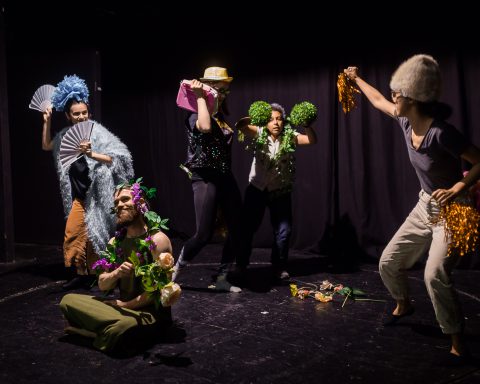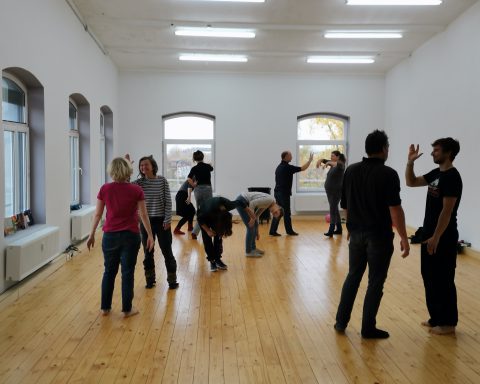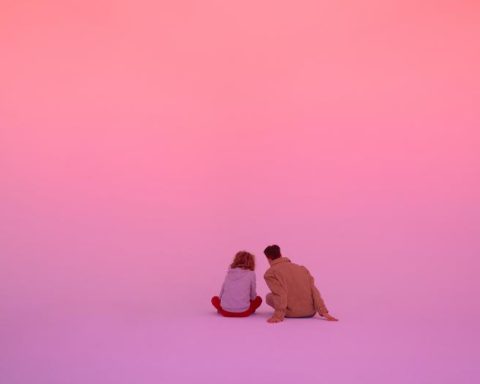On Tuesday 13 June, this reviewer saw a production of Eugène Ionesco’s 1959 absurdist classic “Rhinoceros,” performed at the Neues Schauspiel Leipzig by the students of the Leipzig International School.
The play allows us to experience a shock of connection and recognition. In our hyperpartisan era, the play’s reflections on conformism, groupthink, woke-ism and ideological contagion pack a wallop like a 5,000-pound pachyderm’s stomp.
The Romanian-born Ionesco (1909-1994) is said to have written “Rhinoceros” as a response to the spread of fascism in the early 20th century. It is a good choice for a school play, as the script is rich in comedy, suspense and cathartic existential terror.
A bit about “Rhinoceros'” plot
A hungover Bérenger meets his pompous and condescending best friend, Jean, at a restaurant. Jean’s inevitable criticisms about Bérenger’s drinking and dishevelment are interrupted by a rhinoceros charging through the street outside. This provides the staff and the patrons some amusement until the creature charges through the restaurant and destroys everything. At the office, Bérenger arrives late as the boss and the other workers are having an argument about the absurd news reports regarding these animals. The attractive but not overly bright Daisy insists she saw the rhinoceros with her own eyes. Bérenger says the same thing, but it’s not until a coworker on the street below changes into a rhinoceros before their eyes that they grasp the importance, and absurdity, of what is happening. Soon, everyone is becoming a rhinoceros, and Bérenger is feeling the pressure to conform.
To say the experience of watching this particular production was enjoyable, would be to do it a disservice. Although clearly a comment on fascism or any other “isms” that arise amongst our population, the students approached it in a way that was lighthearted and fun. Even for someone like me, who has never been a fan of absurd theatre.
The sheer joy and enthusiasm with which these young people approached the topic won me over from start to finish.
The audience was sparsely populated, and to be fair, a lot of them were friends and family of those on stage. However, I don’t think I heard one forced laugh the entire night. Every chuckle, giggle and guffaw was genuine.
The set was just odd enough to match the absurdity of the play, and yet just real enough to follow the action. Costumes were likewise just enough to be believable. The different characters, all ably portrayed by LIS students from grades 8 through 12, still made an impression, regardless of tweaks to age and gender.
“Rhinoceros” is a play full of double speak, double entendres, and endless repetition of set phrases, designed to bring to the fore humanity’s penchant for herd behaviour.
One has to follow the dialogue carefully in order to understand what is going on and, given the length of the play, it was quite a feat for these young people, who are doing all of this alongside their school commitments as well.
Even when it was clear that somebody, somewhere was grasping for their line, what impressed me the most was how the kids pulled together, worked together, supported each other and got each other through to the end of each scene.
What struck me, too, was the contrast between the two main characters, Bérenger and his friend Jean. The first scene exemplified this; the difference between the two characters is so very stark, with Jean’s superciliousness in posture and mannerisms and Bérenger’s fidgety underachieving blandness showing off the best of both actors. Let’s admit it: we all know somebody like Jean and somebody like Bérenger. Seeing the two of them sitting at a table in the marketplace, discussing nothing very much at all, and then getting tangled up in their arguments with each other seemed really lifelike, despite the (off-stage) appearance of a couple of rhinoceroses in the middle of it all!
It was those touches of realism in amongst all the absurdity that saved this from being “just another school production.” These young people and their enthusiasm made it entertaining and fun—the audience clearly loved every minute of it. The laughs were hearty and regular, and the standing ovation at the end was very well deserved by all.








